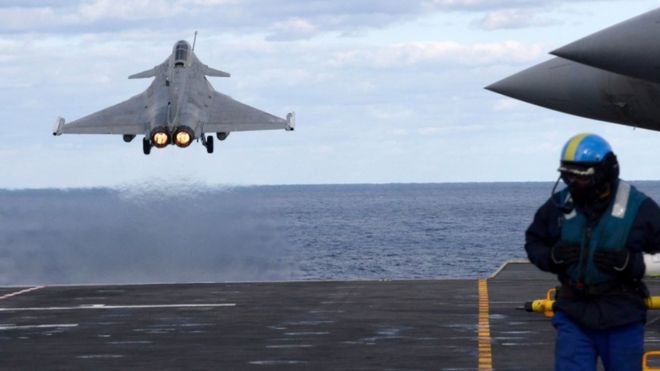By Pierre Tran
Paris – France has pulled out of a NATO naval mission in the Mediterranean in protest against a Turkish frigate allegedly switching on targeting radar on a French warship, plunging ties between two members of the military alliance to a new low.
“The president of the French republic has decided to withdraw French capabilities from Sea Guardian until further notice,” armed forces minister Florence Parly told July 2 members of the European parliament on the defense and security committee.
That French suspension from the Nato maritime security operation, dubbed Sea Guardian, was in response to a Turkish warship, the Orucreis, June 10 “lighting up” with targeting radar a French frigate, the Courbet, which sought to inspect a Turkish cargo ship.
“That is an aggressive act and undignified for a Nato ally,” Parly said.
The Turkish cargo ship, suspected to be carrying weapons to Libya, was escorted by three Turkish frigates, which were also sailing in the Nato mission, daily Le Figaro reported.
Turkey strongly denied that charge, with the Turkish foreign minister Mevlut Cavusoglu July 2 calling on France to apologize.
“We are waiting to France to apologize, that it apologize unconditionally,” he said at a press conference in Berlin with his German counterpart, Heiko Maas, AFP news agency reported.
The Turkish minister accused France of sending weapons to Gen. Khalifa Haftar, head of the Libyan National Army (LNA), which seeks to topple the UN-recognized Government of National Accord (GNA) in Tripoli.
France has made four requests, namely reaffirmation of respecting the arms embargo on Libya, Turkey giving up the use of Nato cover while making arms shipments, greater cooperation between the European Union and Nato, and mechanism to cut conflict, Parly said.
Parly raised the alleged naval incident at a June 17 Nato meeting, received support from eight members of the alliance, and a pledge from secretary general Jens Stoltenberg to conduct an inquiry, afternoon daily Le Monde reported.
The resulting classified Nato report avoided pointing the finger at Turkey despite information, notably electronic warfare data, supplied by the French. That lack of support led to the French ambassador to Nato writing June 30 a letter to Stoltenberg, informing him that France was suspending its contribution to Sea Guardian.
Macron June 30 placed the “historic and criminal responsibility” of Turkey for the situation in Libya.
Turkey said it backs the internationally recognized Government of National Accord and accused France of backing forces led by Haftar, supported by Egypt, Russia, and the United Arab Emirates. Weapons shipped to forces led by Haftar would breach the arms embargo.
France deployed a frigate and a maritime patrol aircraft in support of that Nato bid to police the UN arms embargo on Libya. Paris continues to deploy a frigate and a maritime patrol aircraft to the EU Irini naval mission to police the arms embargo.
Macron has previously said Nato suffered from “brain death,” following a lack of response to Turkey’s invasion into northern Syria last year.
Turkey’s acquisition of the Russian S-400 missile strained relations with Nato, and led to the US withdrawing the sale of the F-35 fighter jet to the Turkish air force.
Turkish companies will continue to build key parts for the F-35 until 2022, Bloomberg reported.
The featured photo: France is suspending its role in Operation Sea Guardian, saying Turkey does not “respect” the Libya embargo: Getty Images
Photo Source: world-europe-53262725
Editor’s Note: In our forthcoming book, The Return of Direct Defense in Europe: Meeting the 21st Century Authoritarian Challenge. we address Turkey as one of the key authoritarian challenges.
“Turkey under President Erdoğan has seen a significant change from being a secular state focused on close collaboration with the liberal democracies to one more focused on its Islamic and national identities and playing off of the European alliances, both the European Union and NATO.
“Erdoğan has sought to expand Turkey’s independent role in the world and has actively pursued a redefinition of Turkish interests away from Westernization and Europeanization to shaping an expanded role in the Middle East, North Africa, and embracing Putin’s Russia as a partner.”
And we concluded: “The alliance within alliance challenge becomes a key dynamic which will drive change in the European alliances. If one combines, the migratory dynamics of the past ten years, with the return of direct defense as the Russians have returned to reshape threats to Europe along with the combined Russian and Chinese effort to make the world safe for authoritarian regimes, the differentiation among the European nations about how best to shape their abilities to defend their interests is to be anticipated and expected. This clearly is remaking of the European alliances, within which Turkey has a significant impact.
“In short, we are facing a major strategic shift within Europe with regard to how alliances will operate, be shaped and be forged going forward to deal with the 21st century political and strategic environment.”
The book will be published this Fall and we will announce its publication and where to buy the book to our readers this Fall.
Laird & delaporte book cover option 2

